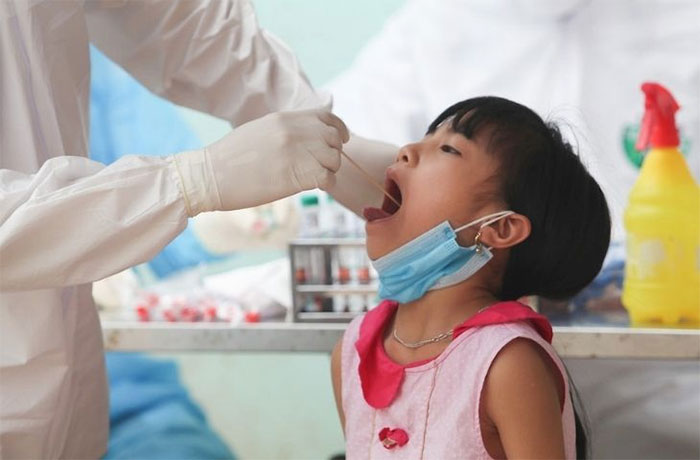The situation of Covid-19 in the city is becoming increasingly complex, with a high rise in new cases, including among children.
Preventive measures remain crucial, including adherence to the 5K guidelines, vaccination for children aged 12 and older, early detection, and stratified treatment based on the severity of the illness.

In the case of a child being an F0 treated at home, parents need to care for and manage them closely. (Illustrative image).
Treating Mild Covid-19 in Children at Home
- Isolate in a separate room
- Implement standard preventive measures, including wearing masks for children aged 2 and older
Symptomatic Treatment
- Reduce fever if temperature reaches ≥ 38.5°C. Administer Paracetamol at a dose of 10-15mg/kg every 6 hours
- Cough treatment: Prioritize herbal cough medicines
- Encourage drinking plenty of fluids
- Parents should ensure adequate nutrition for their children through meals to provide energy and boost immunity. For breastfeeding infants, mothers should maintain a nutritious diet to pass on nutrients through breast milk.
- Maintain personal hygiene, including oral and nasal care
- Encourage light exercise at home for at least 15 minutes a day (for older children)
- Create a cheerful and comfortable atmosphere to help children feel more at ease during home isolation. Additionally, guide them in regular physical activities to enhance their health.
Monitoring
- Measure temperature at least twice a day, or whenever the child feels feverish
- Check SpO2 levels at least twice a day, or if the child appears fatigued, breathes rapidly, or has difficulty breathing
Have contact information for healthcare personnel available for consultation and support (contact numbers for local health stations, mobile health stations, or emergency response teams in the district).
All household members living with an F0 must report their health status through the “electronic health declaration” software at least once a day or as needed.
When to Take an F0 Child to the Hospital
For young children infected with Covid-19, the incubation period ranges from 2 to 14 days, averaging 4 to 5 days. Children may be asymptomatic, but most will experience initial symptoms such as cough, fever, fatigue, sore throat, nasal congestion, vomiting, and diarrhea. Most symptoms are mild, and children can recover on their own within 1 to 2 weeks with proper care.
However, there are cases where the condition worsens and requires immediate medical intervention to prevent serious complications. If a child exhibits any of the following signs, parents should contact healthcare personnel immediately:
- High fever, red eyes, red lips, swollen hands and feet, rash, sore throat, etc.
- Vomiting, seizures, difficulty breathing
- Infants refusing to breastfeed, being irritable, or not alert.
In addition to the above symptoms, parents should regularly monitor the child’s pulse, respiratory rate, blood pressure, and SpO2 levels. If the child has a respiratory rate exceeding 40 breaths per minute (for children aged 1 to 5 years) and over 30 breaths per minute (for children aged 5 to 12 years) or if SpO2 falls below 95%, they must report this to healthcare personnel for timely assistance.
Expert Recommendations for Treating F0 Children at Home
According to Dr. Chu Quang Liên, Head of the Emergency Department at Hồng Ngọc General Hospital: “Children are particularly susceptible to Covid-19 when in contact with infected individuals due to their still-developing immune systems. In cases where a child is an F0 treated at home, parents must closely monitor and manage them, as children do not yet know how to care for themselves, and many young children cannot express their discomfort. Therefore, parents need to observe carefully; if the child shows severe symptoms, they should be taken to authorized hospitals for F0 treatment for timely emergency care to avoid life-threatening complications.”
Dr. Liên also advises: “Given the increasingly dangerous situation of the pandemic, parents should limit their children’s outings and visits to crowded places unless absolutely necessary. If it is essential to go out, children should wear masks properly, sanitize their hands carefully, and maintain a minimum distance of 2 meters from others. Additionally, parents should pay attention to their children’s diet, ensuring they receive adequate nutrients to boost their immunity.”


















































